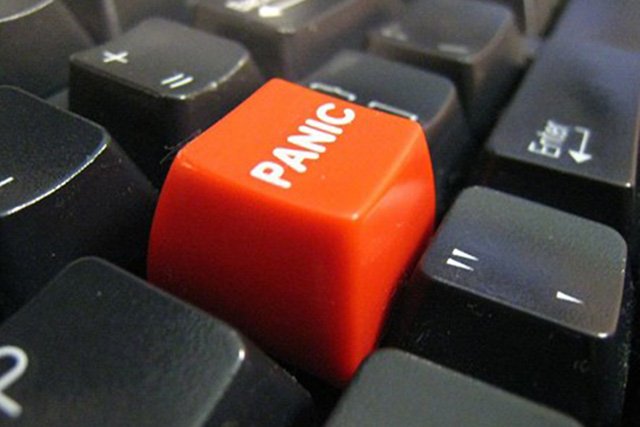Ongoing…
If you enjoy the content at iBankCoin, please follow us on Twitter
18 years in Wall Street, left after finding out it was all horseshit. Founder/ Master and Commander: iBankCoin, finance news and commentary from the future.
Joined Nov 10, 2007
23,419 Blog Posts






Was this overheard, in somebody’s bedroom?
Fly is projecting again.
hahaha. Man you really do have to read all the comments around here.
There’s mechanical trading, and there’s balls to the wall trading, gut feel, outsmart the idiot on the other side type trading. I have an edge, and the market will discover the undervalued securities in which I’ve invest.
I’d venture that Fly prefers the latter.
POT to $1000, MOS to $500; much to The Flys’ chagrin.
http://online.wsj.com/article/SB121184502828121269.html?mod=yahoo_hs&ru=yahoo
PAGE ONE
Lofty Prices for Fertilizer
Put Farmers in a Squeeze
By LAUREN ETTER
May 27, 2008; Page A1
At a time when food prices are soaring world-wide, so is the price of fertilizer, producing huge profits for leading fertilizer makers and stirring anger among farmers in the U.S. and India.
Fertilizer prices are rising faster than those of almost any other raw material used by farmers. In April, farmers paid 65% more for fertilizer than they did a year earlier, according to the U.S. Department of Agriculture. That compares with price increases of 43% for fuel, 30% for seeds and 3.8% for chemicals such as weedkillers and insecticides over the same period, according to Agriculture Department indexes.
Those skyrocketing costs are making it harder for farmers to expand their harvests in response to the global food crisis that has sparked rioting, rationing and export controls in many countries. Food prices have soared in recent months as the world’s growing demand for grain, which has exceeded production for much of this decade, has reduced stockpiles to extremely low levels.
[Higher Farming Costs]
That’s helped to draw attention to farm-production costs, including fertilizer. Farmers say too much market power is concentrated in the hands of a small group of companies in the U.S., Canada and Russia that dominate global production of potash and phosphate. Along with nitrogen, potassium, usually in the form of potash, and phosphorus, in the form of phosphate, are the main ingredients of fertilizer.
The price of fertilizer “defies rational explanation,” says Robert Carlson, president of the North Dakota Farmers Union, one of the state’s most influential farmers’ groups. In a May 8 letter to North Dakota’s three-member congressional delegation, he accused fertilizer companies of “price gouging,” and asked for an investigation.
On Friday, Sen. Byron L. Dorgan, a North Dakota Democrat, said he is asking the Federal Trade Commission to scrutinize the industry’s business practices. Sen. Dorgan heads the Senate Commerce subcommittee that oversees the FTC.
Tight Supplies Blamed
Major fertilizer producers deny any allegations of gouging. They say they are simply raising prices to reflect tight supplies and growing demand after years of relatively low prices.
But there’s an unusual piece in the pricing puzzle: In several countries, obscure laws shield makers of potash and phosphate from certain antitrust rules. In the U.S., for example, phosphate makers are among a handful of industries empowered by the 1918 Webb-Pomerene Act to talk with competitors about pricing and other issues.
Some legal experts think that law has outlived its usefulness. “It’s an obscure act that’s moribund,” says Jim Mongoven, an attorney in the FTC’s Bureau of Competition.
FROM THE ARCHIVES
• Dairy Co-Op Faces Price-Manipulation Probe1
05/19/08
• In Ukraine, Tiny Plots Of Farmland Spur Big Bet2
05/12/08
• ‘Saudi Arabia of Milk’ Hits Production Limits3
05/08/08
• As Food Prices Rise, Shoppers Stock Up4
05/01/08
In India, the head of one of India’s largest buyers of fertilizer is appealing to the United Nations for help. “The fertilizer prices are artificially going up due to the manipulation of traders and suppliers,” said Udai Shanker Awasthi, president of Indian Farmers Fertilizer Co-operative Ltd., in an interview Friday.
China, after initial protests, recently agreed to pay $576 per ton of potash, up $400 from its previous deal in 2007, to Canpotex, a potash export cartel protected by an exemption in Canada’s Competition Law.
In March, Russian antimonopoly regulators required the country’s largest potash maker, Uralkali, to cut domestic prices of the plant nutrient after wrangling with the company over its pricing behavior in court. Brazil’s government is considering nationalizing the country’s fertilizer deposits to help reduce farmers’ production costs.
Helped by soaring potash prices, Potash Corp. of Saskatchewan Inc., one of the companies that make up Canpotex along with Minnesota-based Mosaic Co. and a smaller Canadian producer called Agrium Inc., posted first-quarter net income of $566 million, or $1.74 a diluted share, nearly triple the year-earlier figure. The company’s stock has risen nearly eightfold to around $200 from about $25 three years ago. Mosaic’s latest quarterly earnings came in at $520.8 million, up more than 10-fold from a year earlier.
Phosphate, a mineral found in fossilized marine life, provides essential nutrients for plant-cell development, while potash, a rock mined from the earth, helps plants grow strong. Prices of both are climbing faster than those of nitrogen, which is manufactured in a process that requires lots of natural gas.
In North America, nitrogen fertilizers are applied liberally to corn and wheat fields. Urea, a nitrogen-carrying fertilizer, is selling for around $600 a ton, twice the price a year ago, mostly because of a steep run-up in natural-gas prices.
The price of phosphate has climbed to about $1,000 a ton, up from $365 last year, according to Green Markets, a trade publication, while the price of a ton of potash is now more than $700, up from $230.
Industry executives say their companies are trying to ramp up production by making their mines run more efficiently, but there are few new mines on the drawing board.
Michael R. Rahm, vice president of market and economic analysis at Mosaic, said his company’s prices are a true reflection of supply and demand. “The industry was not equipped to deal with the surge” in demand, he said. Still, he said he understands how farmers might be concerned as prices continue to rise.
Bill Doyle, chief executive of Potash Corp., told investors in April on a conference call about quarterly earnings that buyers could soon be paying $1,000 a ton for potash. He added during the call that continued price rises will “be a shock” to some consumers.
In an interview Monday, Mr. Doyle called recent complaints about prices an emotional reaction. Fertilizer prices began rising in earnest about a year ago after a nearly decadelong period of stability. “People don’t like higher prices,” Mr. Doyle said. But “you never hear from anyone complaining when prices are low.”
Mr. Doyle said he welcomes any investigation into his business but added that regulators will come to realize that the higher prices are “a pure function of the marketplace.”
Outside analysts say the industry has plenty of supply. “There’s not really a supply issue at the moment,” said Steve Jesse, an agriculture economist at Rabobank Group of the Netherlands, a large lender to agribusiness around the world. The U.N.’s Food and Agriculture Organization said in a forecast in February that the world’s supply of nitrogen, phosphate and potash is “comfortably sufficient to cover demand growth” through at least 2012.
Chemical fertilizers are so effective in raising crop yields that economists figure farmers would be able to feed billions fewer people without them. Fewer than a dozen countries have substantial potash reserves, while more than 160 countries consume the fertilizer.
Fertilizer manufacturers say they intend to focus on increasing the productivity of their existing mines. Mosaic, in which Cargill Inc. of Minneapolis holds a controlling stake, said it plans to “de-bottleneck” some of its Florida phosphate mines to boost supply.
Phosphate Mining
Potash Corp. said it can raise production to 15.7 million tons by 2015 from its current capacity of 10.2 million tons by improving the operation of its existing mines. Opening a new phosphate mine can cost more than $2.5 billion and take around seven years, the company said.
“Developing new production takes a long time, a lot of money, and an expertise that few possess,” Potash Corp.’s Mr. Doyle recently told investors.
In the U.S., Potash Corp. and Mosaic are the sole surviving members of a phosphate export cartel called the Phosphate Chemicals Association. Under a 90-year-old law designed to promote American exports, the companies are allowed to legally market and sell their product overseas as a single entity at a price set in consultation with one another. Similarly, Canada has Canpotex, and Russia has Belarus Potash Co., another export cartel.
While the individual cartels can’t legally collaborate among themselves on pricing, they regularly — and legally — follow each others’ price increases. After the Russian cartel recently said potash prices would rise to $1,000 a ton, Potash Corp.’s Mr. Doyle said Canpotex would soon match that price.
Denis Evstratenko, a UBS metals and mining analyst, said the cartels have little incentive to undercut one another in the current environment.
To protect American consumers, members of the U.S. cartel are required by law to compete against each other in selling their wares at home. But in today’s global markets, the global price sets a benchmark so American farmers pay essentially what the cartels dictate.
“That’s the whole key that we’re running into this year,” said John Hawkins, a spokesman for the Illinois Farm Bureau. “The barriers that we have seen in the past between domestic and international prices have just fallen down. We’re now participating in a global fertilizer market.”
Commodities are going to rip lower. Just wait and see.
Those Chinese phuckers came for my pig again. I was asleep. They didn’t take the pig. They left a note. “we didn’t have room for the pig this time because we swiped FTK’s 2008 earnings estimates.”
Good bill cara post:
http://www.billcara.com/archives/2008/05/bill_caras_community_chat_mon_3.html#more
May 26, 2008
Bill Cara’s Community Chat, Mon., May 26, 2008, 9:00am ET
Nowhere is there a better proof of concept that rapid economic growth does not always lead to rising stock prices as we can see happening today in China.
Within six months from setting a record high index level in October 2007, the Shanghai Composite plunged -51.2%. A month or so later, this index is still down -45.1% from its high.
Yet, over the past four years, the real growth rate, ie, growth over and above inflation, has been accelerating from +9.1% to +10.2% to +10.7% to about +11% this year.
What happened in October in China I think can be summed up in two facts: (i) the average price-earnings multiple stood at 65 times 2007 earnings according to Frank Gong, chief China economist at JPMorgan Securities (Asia Pacific), and (ii) the Chinese authorities (ie, the State Administration of Foreign Exchange) set the stage with a plan to allow mainland retail investors to buy shares in Hong Kong stocks, which had at the time much lower P-E’s.
With the latter point, it was not until mid-March that the Hong Kong market index started to far out-perform the Shanghai index. You can see this if you set the beginning of the interactive comparison chart for $SSEC and $HSI to October-07.
I think there is a reason for that. You see, it was right after the March 17 melt-down that six Chinese companies announced initial public offerings in Hong Kong. The hype there became intense.
Traders should know the expression, “Stocks aren’t bought; they are sold.†That means simply that story-telling and hype are the major driving forces to higher stock prices, not analysis and common sense.
Like the Shanghai Composite, however, the Hang Seng of Hong Kong, now appears to be cooked like a Peking Duck—roasted.
Yes, the hype has grown old, and maybe common sense prevails.
FTK, egregious, no?
This is what happens when you play in the toilet bowl. The real turds sink bakc to the bottom.
LEH is shatting the proverbial shower nicely. Looks like BofA commented on 2Q…
Inadequacy? You better reach down and feel again fly.
Fly – got any more shorts like FTK?
LMAOROTF
with friends that fly has, who needs enemies (FTK – “the smartest guy I know is heavy long”) – LOL!
FTK is the worst run company in the world. How can you not be making bank with oil at euphoric highs.
I was actually short a boatload of FTK …. HAPPY BIRTHDAY, FLY !!!!!!
FXP, SMN and DUG are about to take off. Heavy buying in FXP.
OIL Materials Steel Grains get short it all.
Question: Would heavy buying in FXP, actually cause the underlying stocks in FXI to go down ?
Hence making FXP go up even more ? Assuming that heavy buying is abnormally larger than normal volume.